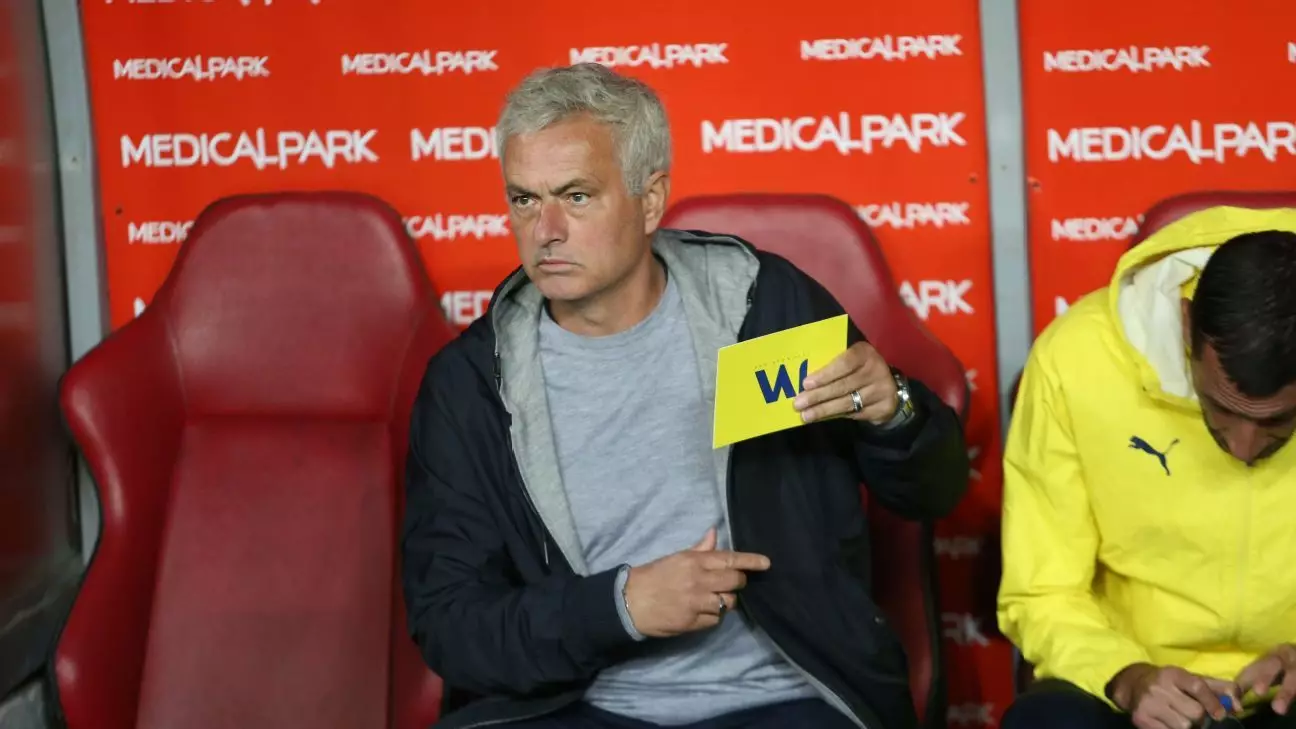Fenerbahce’s head coach, José Mourinho, has recently weighed in on the predicament facing Manchester United, his former club. The current dynamics at Old Trafford have seen Erik ten Hag’s squad languishing in 12th place in the Premier League, having secured victory in just three of their first eight matches. In addition, the team has struggled in the Europa League, failing to claim even a single point so far. Mourinho’s remarks come ahead of a pivotal match between his current team and United, which adds an extra layer of complexity to the situation.
Mourinho’s insights stem from a thorough analysis of United’s gameplay and structure. “There is work there, and they will succeed sooner or later,” he stated during a recent news conference. This statement, brimming with optimism, reflects Mourinho’s unwavering belief in the squad’s potential, despite the negative results that have characterized their start to the season. Such faith is critical, not only within the ranks of an organization but also in the eyes of fans who have become increasingly disillusioned with the team’s recent performances.
Reflecting on the growing discontent among United supporters, Mourinho empathized with their frustrations, particularly regarding the team’s solitary win in its last nine European encounters. “They have a better team than the results are showing,” he pointed out, underscoring a common theme in sports: the notion that talent and performance do not always align seamlessly.
A recent 2-1 victory over Brentford may have provided a glimmer of hope for Ten Hag and his players, yet it does little to mask the severity of the underlying issues. Mourinho’s acknowledgment of the team’s struggles reveals an understanding that surface-level victories may not be sufficient in restoring the confidence of players and fans alike.
The contrasting fortunes of Manchester United and Fenerbahce’s coaching staff exemplify the challenges of modern football management, where stability and performance must go hand in hand. Mourinho’s tenure at United, which lasted from 2016 to 2018, ended tumultuously, with the club being 11 points adrift of Champions League contention at the time of his dismissal.
Even amid adversity, Mourinho offered words of encouragement to his former colleagues, wishing them success and emphasizing the importance of stability under Ten Hag. “They keep faith in the coach,” he noted, recognizing the club’s commitment to providing their current manager with the necessary conditions for growth and development. Such a culture of stability is crucial for long-term success in football, as it fosters an environment where coaches can implement strategies and build teams without the constant threat of dismissal.
However, the contrasting circumstances between Mourinho’s experience at United and that of Ten Hag today provides food for thought. Mourinho implied that the support Ten Hag is receiving marks a significant difference compared to when he was in charge, perhaps suggesting that learning from past mistakes is vital for the continued evolution of the club.
Mourinho remains an optimistic voice regarding Manchester United’s potential to achieve success in the Europa League. He placed United and Tottenham at the forefront of the competition, elevating the narrative that despite their ongoing troubles, the club still harbors the talent capable of securing silverware. As Mourinho points out, the intensity and quality of the Premier League are unmatched, and each match is a high-stakes affair.
Adding to the drama is the ongoing investigation into Manchester City’s alleged Financial Fair Play violations. Mourinho hinted at a possible scenario where United could be crowned champions retroactively if City were to face repercussions. This underscores the unpredictability and high stakes that surround football narratives, weaving a complex tapestry where past glories and current challenges intersect.
Mourinho’s reflections highlight an intricate blend of realism and hope surrounding Manchester United’s current situation. His unwavering support and belief in the club’s potential serve as a reminder of the cyclical nature of sports. Despite the challenges at hand, the overarching theme remains: resilience and hope are vital for turning the tide. After all, in football as in life, the only constant is change.

